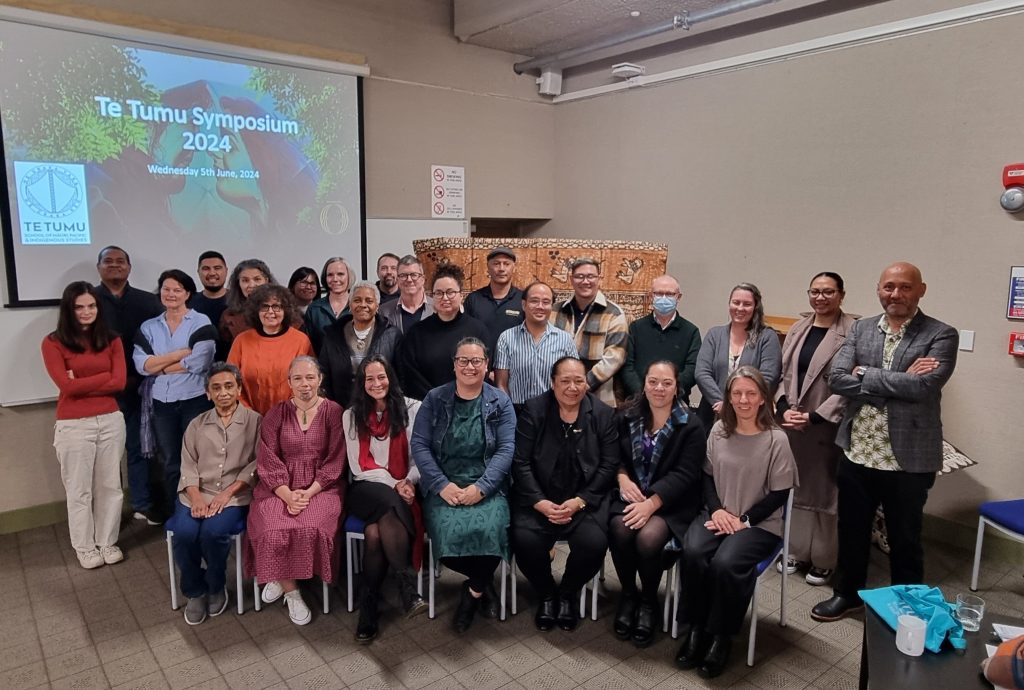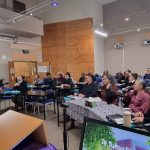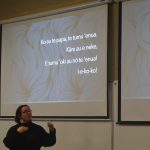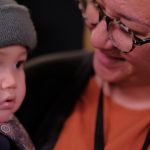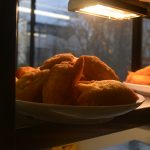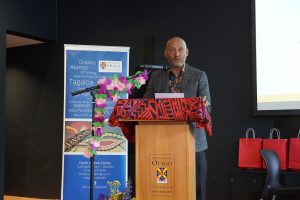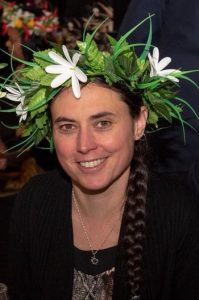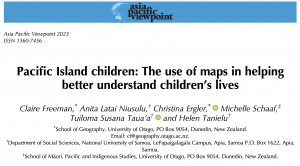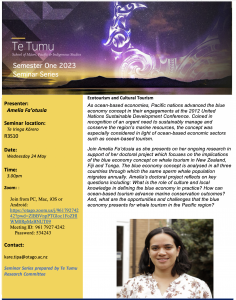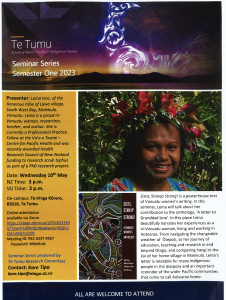Inaugural Te Tumu Symposium a showcase of diverse research excellence
On Wednesday 5 June, Te Tumu, School of Māori, Pacific and Indigenous Studies, hosted its inaugural research symposium to share and celebrate research from Te Tumu. The day began with a welcome from Te Tumu Dean Prof Patrick Vakaoti and a history of Te Tumu from Prof Michael Reilly. The programme included four sessions of Te Tumu staff and postgraduate students’ presentations, constructive question and answers segments, feedback, and encouragement.
Supported by Te Tumu’s Research Committee and Postgraduate Committee, the event welcomed attendance from those who are based in Ōtepoti, as well as distance students who are based in Te Whanganui ā Tara, and as far afield as New Caledonia. With special Tītī and fry bread kai, this gathering was truly an inspiring occasion and speaks to exciting research work that Te Tumu staff and students are doing locally, and regionally that are important contributions for their communities, and for the growth of Māori, Pacific and Indigenous Studies scholarship.
Session 1 was facilitated by Dr Paerau Warbrick, a lecturer in Māori Studies, and included presentations by Te Tumu staff member Paia Taani on intergenerational language transmission; and PhD students, Jenni Tupu who presented about transracial adoption, and Ella Cameron-Smith who presented on Ngaati Korokii Kahukura kai identities.
Session 2 was facilitated by Dr Telesia Kalavite, a lecturer in Pacific Studies, and included presentations by four PhD students: Frédéric Dichtel who presented on te reo grammatical structures; Regina Maniam who presented on engaging Indigenous values and methods in doctoral research; Stacey Kokaua-Balfour who presented on Cook Islands’ creative texts relating to the environment and climate change; and Jay Quintos who presented on critical perspectives on films about the Tboli people in the Philippines.
Session 3 was facilitated by Prof Michael Reilly, the Postgraduate Chair of Te Tumu. The session included staff member Prof Richard Jackson who presented on non-violent approaches to counterterrorism, and two PhD students: Jude Bautista who presented on visual social semiotics and critical lenses in discourse analyses; Kim Cope Tait who presented on personal sovereignty in the poetry of Hinemoana Baker.
Session 4 was facilitated by Dr Emma Powell, lecturer in Indigenous Studies and Programme Coordinator of the Master of Indigenous Studies (MIndS). The session included three MIndS distance students: Melissa Denzler, based in Te Whanganui ā Tara who presented on the cultural taxation of kaiako Māori; Elizabeth Hamilton, based in Whakatū, who presented on a approach for honouring Te Tiriti specifically relating to language learning policies for migrants and former refugees; and James Uri-Puati, based in the Cook Islands, who presented on a critical Indigenous framework for theorising second language learning.
Niue texts researcher signs MOU with Tāoga Niue

Last week, Dr Jess Pasisi (Mutalau, Hikutavake, Niue; Ngāti Pikiao, Tahiti) signed a Memorandum of Understanding (MOU) alongside Moira Enetama, Director of Tāoga Niue, Ministry of Social Services, of the Government of Niue. The MOU relates to Dr Pasisi’s Marsden […]
PacTNet panel discussion & Pacific Voices Alumni celebration
On 27 November 2023, 20 years of the University of Otago’s Pacific Voices Postgraduate Symposium was celebrated with alumni, staff and current Pacific students at the Auahi Ora space in the Student Union Building. The evening programme began with an address from Tofilau Nina Kirifi-Alai, past manager of the Pacific Islands Centre and current Pacific Community Engagement Manager in Auckland. Tofilau shared reflections on establishing the symposium after seeing the need for postgraduate support in 2002 and gave encouraging words for organisers and students taking the symposium forward.
Her opening remarks were followed by an address from Deputy Vice Chancellor, Research & Enterprise, Professor Richard Blaikie who commented on Pacific research within the context of the University’s strategic direction. He enthusiastically supported Tofilau’s opening remarks and later engaged openly with the audience during the Q&A session at the end of the evening.
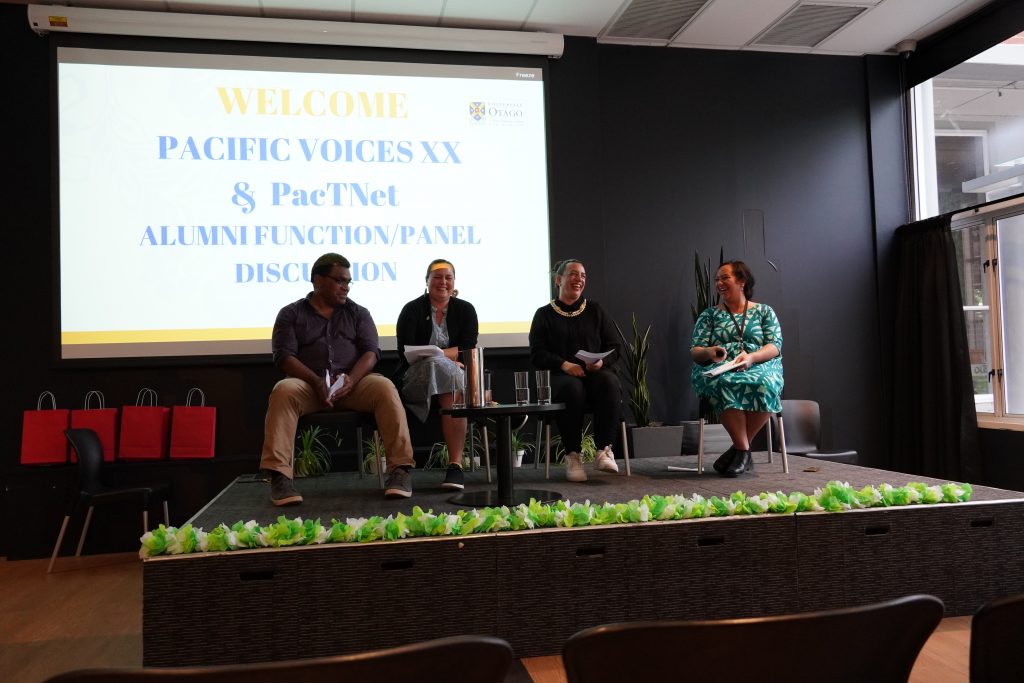
Panelists L-R Dr Tui Rakuita (Sociology), Dr Jess Pasisi (Te Tumu), Professor Rose Richards (Acting Director, Pacific Development Office & Co-Director of Coastal People, Southern Skies) and facilitator Dr Emma Powell (Te Tumu).
As a part of the programme, the symposium organisers and staff from the Pacific Development Office teamed up with the Pacific Thought Network (PacTNet) to arrange a public panel discussion. Earlier this year in May, PacTNet held its inaugural Pacific Lecture which was given by Tootooleaava Dr Fanaafi Aiono Le-Tagaloa and the panel gathered key Pacific thinkers from our university community to reflect on the ideas and comments made in the lecture. The panellists were Professor Rose Richards (Acting Director, Pacific Development Office & Co-Director of Coastal People, Southern Skies), Dr Tui Rakuita from Sociology and our very own, Dr Jess Pasisi. All of the panellists gave stimulating thoughts on Tootooleaava’s lecture, ranging from comment on Pacific leadership at the University of Otago, the significance of the diaspora to Pacific thinking, and the romanticism with which we hold Indigenous knowledge.
The PacTNet steering committee is made up of a number of our Te Tumu staff: Professor Patrick Vakaoti, Dr Telesia Kalavite and Dr Emma Powell. They are also joined by Dr Allamanda Fa‘atoese who is based in Christchurch and Dr Charles Radclyffe from Archaeology.
A number of our Te Tumu students participated and presented on their research during the Pacific Voices Symposium XX which was held on the following day, Tuesday 28 November 2023. For photos and coverage, check out the story from Pacific Communications Advisor, Keilah Vaetoru Fox, here.
Te reo Māori o ngā Kūki ‘Āirani: Dr Akevai Nicholas
Earlier in the week Te Tumu hosted a visiting scholar from the University of Auckland, Dr Akevai Nicholas. Akevai is from the island of Ma‘uke (Cook Islands) and is a Senior lecturer in Māori studies at the University of Auckland. She has a linguistics and Māori Studies background and her research focuses on the description, documentation, and revitalisation of her ancestral language.
Staff and students of Te Tumu, and the wider University community, were fortunate to meet and engage in a rich and insightful kōrero with Akevai. Informal in nature, the discussion and questions from those present kept rolling in and Akevai’s knowledge and expertise in the area of linguistics associated with te reo Māori o konei me ngā Kūki ‘Āirani was notable. A sobering point of discussion was the worryingly low proportion of Cook Islands Māori speakers in Aotearoa and the home island, it is a language that is very much in critical need of revitalisation and initiatives to teach the youth their language, sometimes alongside their parents. There is no denying a connection between Māori of Aotearoa and Māori of Kūki ‘Airani, genealogically, culturally and linguistically, therefore, a call to support and work together to achieve their reo aspirations is needed.
Some of the other key messages and kaupapa discussed included intergenerational language transmission, the geography and demography of the speaking populations, the introduction and interaction with English speaking people and some key researchers and leaders in linguistics of Indigenous Polynesian languages from the 1960’s to now. It was not difficult to hear the impact Dr Akevai Nicholas is making with her research, a trail blazer, a strong advocate and a passionate Ma‘ukean, who is a crucial champion of and for the revitalisation of te reo Māori o ngā Kūki ‘Āirani and te reo Māori Aotearoa. Meitaki nui Dr Akevai Nicholas.
Re-visioning Pacific research method/ologies in the new issue of Waka Kuaka (Journal of the Polynesian Society)
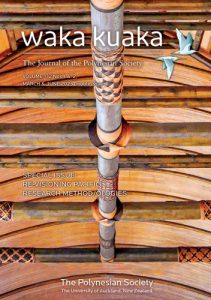
The beautiful lalava (lashings) created by Sopolemelama Filipe Tohi in the Fale Pasifika at the University of Auckland. (Picture by Julia Mageau Gray.) Click image to enlarge.
The Journal of the Polynesian Society has renewed its branding with the addition of its new name, Waka Kuaka. In the second issue, and first special issue under its new title, co-editors Dr Marcia Leenen-Young and Dr Lisa Uperesa of the University of Auckland gathered doctoral candidates and early career Pacific scholars from across Aotearoa, Te Waipounamu and Australia under the theme Re-Visioning Pacific Research Method/ologies. Three of our Te Tumu whānau were involved in the project. Dr Emma Powell and PhD candidate, Wanda Ieremia-Allan were both authors in the issue with their respective articles, “Tei te Akau Roa: An Ocean of Metaphor in Pacific Research Methodologies” and “Feiloa‘iga ma Talanoaga ma ‘āiga: Talanoa with Family in the Archives”. Professor Michael Reilly, a long-time member and supporter of the journal and society, also generously gave his feedback on Leenen-Young and Uperesa’s introduction.
In the words of the co-editors, the issue marks an “…historic shift in research practice and approaches for and by Pacific peoples and is intended to contribute new knowledge about how Pacific research methodologies and methods are being used (alone and in conjunction with other research approaches and methods). The contributions in [the] special issue help to illuminate the mutually constitutive relationship between theory and practice by sharing critical reflections and practical adaptations by early-career researchers who are raising considerations appropriate for the contemporary moment. In building on current knowledge, some deepen our understanding while others elaborate new approaches” (12).
The issue provided an opportunity for early career Pacific scholars to publish in an iconic journal of anthropology and related scholarly fields dedicated to Polynesia and the wider Pacific region. As a part of the issue’s production, the editors facilitated an innovative development and peer review process that was fully funded. The development of the special issue involved an online writing retreat, weekly 2.5 hour online writing sessions prior to draft submission, and a 1.5-day compulsory, in-person closed symposium for a double peer-review process. This was held at the Fale Pasifika in Auckland as was the launch of the issue which was held on 12 June 2023.
Collaborative Pacific research across schools and universities
It is great to see collaborative Pacific research by scholars across Otago’s schools and universities.The latest is a journal article in Asia Pacific Viewpoint featuring Te Tumu’s Dr Michelle Schaff, along with academic staff from the School of Geography and National University of Samoa on the use of maps in helping better understand Pacific children’s lives. Click here to view this open access article.
Abstract
Children’s voices have been little heard in the Pacific research. The United Nations Convention on the Rights of the Child 1989 asserts the child’s right to have a say on matters that affect them and for their views to be considered. There has been massive growth in technologically assisted participative research; however, we argue the value of hand drawn maps should not be underestimated in the rush to engage with more advanced techniques. We present data from 267 neighbourhood maps drawn by children in Fiji, Kiribati, Samoa and New Zealand. To better understand the social construction of knowledge in children’s everyday lives, we propose two models to conceptualise the complexity of their world, a social connection and a spatial connection model. These models reveal how Pacific Island children negotiate different levels of social connection from home, family, and community through to transnational kinship relations. People, specifically family, provide the geographic basis on which their spatial encounters are overlaid. Irrespective of country or rural/urban/atoll setting, it is social space that is the strongest connector for children as displayed in their maps. Application of our models can be used to reveal how knowledge is socially constructed in Pacific children’s everyday lives.
Seminar: Ecotourism and Cultural Tourism
Amelia Fa’otusia, a PhD candidate at Australia National University, is currently in New Zealand undertaking research on whale tourism, as part of a wider comparison with similar ventures in Fiji and Tonga, and has kindly agreed to give a seminar to Te Tumu on “Ecotourism and Cultural Tourism”.
Amelia’s seminar will be in Te Iringa Kōrero (R3S10, 3rd floor of Te Tumu) at 3pm (NZ Time), on Wednesday 24 May.
This will also be available via Zoom. Click here to enter the Zoom Room.
Meeting ID 961 7927 4242
Password 534243
All interested people are most welcome to attend.
Please click on the poster for more information,
Seminar: Leina Isno – Sista, Stanap Strong!
Leina Isno (ni-Vanuatu) will be presenting the next Te Tumu seminar at 3pm (NZ Time), Wednesday 10 May in Te Iringa Kōrero (3rd floor, Te Tumu). Leina will talk about her contribution to Sista, Stanap Strong!: A Vanuatu Women’s Anthology for which she wrote about her experiences as a ni-Vanuatu woman, living and working in Aotearoa.
Please click on the poster for more information.
This seminar will also be online via Zoom, Click here to join.
Meeting password 932 6337 4957
Password: Malekula.
Seminar contact: Kare Tipa, kare.tipa@otago.ac.nz
All are welcome to attend.
To Hell With Drowning: A Reflection
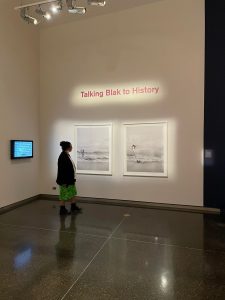
Māori scholar photographs Cook Islands scholar examining Aboriginal artwork confronting White Australian histories at the Australian National Museum, Canberra, April 2023. [click to enlarge]
This is the final reflection from our PhD students who attended the recent Australia Association for Pacific Studies conference in Canberra, by Stacey Kokaua-Balfour.
As someone who has only recently started their PhD, the recent AAPS conference was my first time attending an academic conference. I have come away with not only new questions but the awareness of new geographic and intellectual contexts that might shape those questions. What resonated most with me as someone who has operated in Pacific spaces in Aotearoa for some time, was the way our nation state and its distinct geo-political interests can shape not only how Pacific region and their peoples are framed but also what are considered the most important priorities for academic research.
AAPS was an opportunity to engage with Indigenous thinkers across cultures, nation state borders, languages, breaking across specific colonial interests in the Pacific. The Welcome to Country led by Aunty Serena Williams (Ngunnawal – Wiradjuri) best articulated the idea that as researchers, our best ideas spring from coming together and sharing the distinct and nuanced ways Indigenous peoples engage with land and each other.
Rethinking Australian Coloniality through Pacific Biography
Wanda Ieremia-Allan provides the second of the reflections from our PhD students who attended the recent AAPS conference in Canberra.
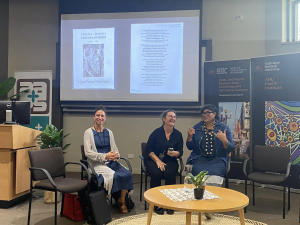
Wanda (right) alongside fellow panel presenters Hineitimoana Greensill and Pauline Reynolds [click to enlarge]
Fleets abound with Pacific scholars, creatives, activists and politicians met at the April 2023 ‘To Hell With Drowning’ Pacific Studies conference at the Australian National University (ANU) in Canberra. As a child of Sapapali’i, Sāoluafata, Safotulafai, Lalomanu, Vaie’e, Matāutu Falealili in Samoa, I extend my Fa’afetai to people of the unceded Ngunnawal and Ngambri lands (Canberra Australia) for their warm welcome and hospitality to country. Thank you also to the Australian Association for Pacific Studies (AAPS) organising committee led by Professor Katerina Teaiwa and Talei Mangioni for their care. Fa’afetai to the AAPS for the Guy Powles travel prize that made it possible for me to attend and I am grateful to my supervisors Dr. Jess Pasisi (Otago), Professor Alice Te Punga Somerville (UBC) and Tootooleaava Dr. Fanaafi Aiono Le-Tagaloa (USP Samoa) for their unwavering support and guidance. Thank you especially to Dr Jess Pasisi for the academic manaakitanga extended to many PhD students.
On a panel with Dr Pauline Reynolds of the Norfolk Island Museum and PhD student Hineitimoana Greensill, I presented my paper on Indigenous Pacific language archives and its role in ‘Rethinking Australian Coloniality through Pacific Biography’. Utilising the intersections between Professor Epeli Hau’ofa’s notion of the ‘totality of relationships’[1] and Māori scholar Professor Alice Te Punga Somerville’s poem ‘Room’[2] provided an opportunity to think about: ancestral links; ideological connections; and spaces of reckoning and recovery.
My paper focussed on Samoan historiography and the kinds of work that are made possible when we centre on Samoan language archives as sites of Indigenous knowledge production and historical recovery. This resulted in the emergence of an intellectual, geographical, linguistic and cultural Pacific expansiveness alongside the rich long standing embodied stories of Pacific connectivity that not only interrogate pervasive Australia white settler colonial histories but demand more institutional university spaces to conduct decolonial work with our languages. Samoan language archives recovered links with fellow kin, in particular South Sea Islanders of Mer Island, Torres Strait Island region where Samoan missionaries and local Mer Island people established the London Missionary Society church named ‘O le Sulu Samoa’ in 1902. Letters from Badu Islands and Vanuatu recovered family histories and brought to light the many ways in which Pacific Islanders see each other and connect over oceans of memory.
Advocating for the use of our own epistemological paradigms in archival engagement is necessary because as matua Tuaopepe Albert Wendt asserts ‘Oceania deserves more than an attempt at mundane fact; only the imagination in free flight can hope, if not to contain her, to grasp some of her shape, plumage and pain’[3]. This is the wero (challenge) set for us all.
[1] Hau’Ofa, E. (1994). Our sea of islands. The Contemporary Pacific, 148-161.
[2] https://nzpoetryshelf.com/2021/05/24/poetry-shelf-noticeboard-alice-te-punga-somervilles-room/
[3] Wendt, Albert, 1982. Towards a New Oceania. In: G. Amirthanayagam. (eds) Writers in East-West Encounter: New Cultural Bearings. London: Palgrave Macmillan, pp 202-215.

